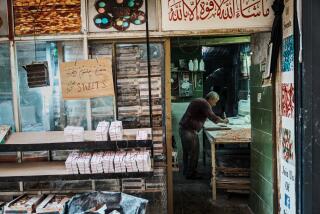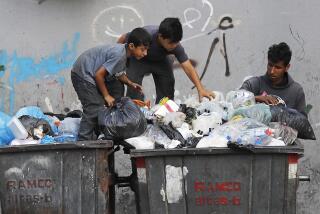I’ll Take That -- and That
BAGHDAD — Wedged between the reports of murder and mayhem, the headline in the local paper was eye-catching: “Should you change your wallpaper for lighter tones?” it asked. “Do it once and you’ll see the results.”
Although there are no lifestyle magazines yet, no Baghdad style mavens and little cause for celebration until some basic security is in place, people are starting to improve a part of life they can control -- the world behind their high walls and locked front doors.
Slowly but surely, ordinary Iraqis are redoing floors, hanging curtains, buying new pictures and feathering their nests after years of doing without.
Furniture and upholstery sellers are reporting strong demand, as are lighting firms, building contractors and plant stores. “I’ve been in this business a long time,” said Muthana Fahawi, a carpet merchant for 25 years in Baghdad’s Karada neighborhood. “Anyone who says the economy isn’t improving isn’t telling the truth. You can feel the money starting to flow.”
Waleed Abdul-Hussain is among those with money burning a hole in his pocket. In the last few months, his laundry business has picked up after years in the doldrums, giving him the confidence to reupholster his couch and buy a new television, a satellite dish, a rug and two small tables.
“We started with the little things we really needed,” he said, relaxing in his small apartment off Palestine Street as his three children crawled in his lap. “Now we’re also thinking of building another room off the kitchen.”
Fueling the early recovery are higher government wages, a newly resurgent middle class and the initial sums of what will be hundreds of millions of dollars in reconstruction money coursing through the economy.
The government is in the process of hiring thousands of police officers and troops. It has raised the salaries of teachers and other civil servants by as much as thirtyfold over those in Saddam Hussein’s days. And there still aren’t a lot of tax collectors, so the money tends to go further. A small television set that used to cost the equivalent of $150 after import taxes, for instance, now goes for $80.
Three wars, decades of economic mismanagement and a 13-year United Nations embargo have left Iraq with enormous pent-up demand. Few ordinary Iraqis could afford to sink much into their homes over the last decade. On the contrary, many were forced to sell appliances and furniture to make ends meet.
“If you don’t have enough to eat, you don’t go buying houseplants,” said Haider Mohammed, owner of a plant nursery in the shadow of the national stadium. “Now we’re even seeing poor people out for a look.”
There may even be a psychological component, as a battered and bruised population indulges in a bit of shopping therapy to brighten its spirits.
“You’re starting to see people enjoy all the gadgetry, the freedom to buy again, even the chance to show off a bit,” said Ihsan Hassan, a sociologist with the University of Baghdad. “It gives people a mental boost.”
A survey in late March by several news organizations, including the BBC, found that 55% of Iraqis were more confident than they had been a year ago and that more than 70% believed next year would be better.
There are few statistics on Iraq’s economy and even fewer that are made public, but Tom Foley, director of private-sector development with the Coalition Provisional Authority, sees pent-up consumer demand as a bright spot.
“Given all that’s happened here, I think the economy’s doing pretty well,” he said in his office in one of Hussein’s former palaces.
Anecdotal evidence suggests that most people still lack the confidence to go on major spending sprees, but they are coming out of their shells enough to buy one item at a time.
“Rather than buy a whole living room set, you’ll see them buy one piece each month,” said Abu Ali, owner for the last decade of a large furniture store in Baghdad’s Adhamiya district. “Families are starting to buy again.”
Jealousy is also helping to open pocketbooks, retailers say.
“It’s a huge source of business,” Iyad Moustaf, the owner of a small reupholstery firm, said as he rattled away on a 20-year-old sewing machine to the sounds of an Iraqi singer on the radio. “One wife gets something, the neighbor has to match it or do better. We depend on it.”
More media channels and more open borders have enabled Madison Avenue to move into the country as well.
“As people watch more TV, they’re seeing these foreign brands and just grabbing them,” said Abu Muslim Akil, 34, manager of the Butterfly Electronics shop here. He was sitting at a desk surrounded by boxed juicers, VCRs, telephones, irons, freezers and ice crushers. “Our American and Japanese imports are nearly sold out.”
But even as more and more Iraqis are out browsing and buying, many are still struggling. “If I could only get a job with the police,” said Hameed Mustafa, 40, who was selling women’s shawls on the road outside a Baghdad shrine. “I’ve made $8 or $10 today and have three kids. We’re getting by, but that’s about it.”
In the Hussein regime’s final years, Iraq’s middle class all but disappeared at the hands of the embargo and a declining economy, merchants say.
As a result, the only ones out shopping were the very rich -- including members of the president’s family, “Tikrit people” from Hussein’s hometown and senior officials, including members of Iraq’s dreaded Mukhabarat secret service.
Even then, merchants gripe, some wouldn’t pay, leaving them in a bind. “You couldn’t exactly take them to court,” said Dauvaod Mohammed, owner of Baghdad’s Kitchen Furniture Co.
Meanwhile, the vast bulk of the population was barely able to get by. Furniture shop owner Ali recalls coming to work one morning just before the war and finding two men waiting to sell him their used stereo because their brother needed a liver operation. They were broke but refused Ali’s offer to help them out, he said, so he gave them far more than the stereo’s worth.
Generally, the first purchase for many Iraqis these days is a television -- and a satellite dish to go with it. Not only is watching television a way to while away the hours indoors in light of the security situation, but it’s also a taste of forbidden fruit. Satellite dishes were outlawed under the old regime.
Along Karada Kharij Street in central Baghdad, the sidewalks and alleys are piled high with boxes of electronics made by LG, Samsung, National, Panasonic and Haier.
Importers say it’s easier to do business these days than under the former regime -- most of the time. Import taxes used to be as high as 300%, said Nahid Abed, owner of the Al Faitha electronics wholesale company, while currency restrictions meant that companies had to pay back-channel operators huge fees to move money out of the country -- often in the trunk of someone’s car.
A sliding scale of payoffs at the customs office were also part of the picture, Abed said, ranging from a few dollars for the ministry janitors to $500 or more for top officials. “It took a lot of time and could get very expensive,” he added.
Nowadays, though, companies are paying a lot more for security. Al Faitha used to employ two security guards. Now it has eight. Abed said friends’ trucks have been hijacked and held for ransom on the road from Jordan. And businessmen carrying large quantities of cash -- there still are no checks in Iraq’s wobbly financial system -- risk arrest as insurgents.
The World Bank estimates that Iraq will need $55 billion over the next four years to rebuild its economy. The U.S. is pledging $18.4 billion over the next three years, money that it believes will resuscitate the economy, provide jobs and blunt insurgency.
Economist Humam Shamaa isn’t so sure, arguing that the U.S.-led coalition is awarding contracts to a relatively small circle of foreign companies and elite Iraqi subcontractors. “The majority of Iraqis will be shut out,” he said. “I don’t expect a big change in average people’s living standards.”
Those handling the cash registers, however, seem a bit more optimistic.
“Business is in the Iraqi bloodstream going back 5,000 years,” said Ali Dham, 23, a currency exchange trader. “If there’s a proper government that isn’t corrupt, and people start feeling safer, things could start to do very well.”
More to Read
Sign up for Essential California
The most important California stories and recommendations in your inbox every morning.
You may occasionally receive promotional content from the Los Angeles Times.










